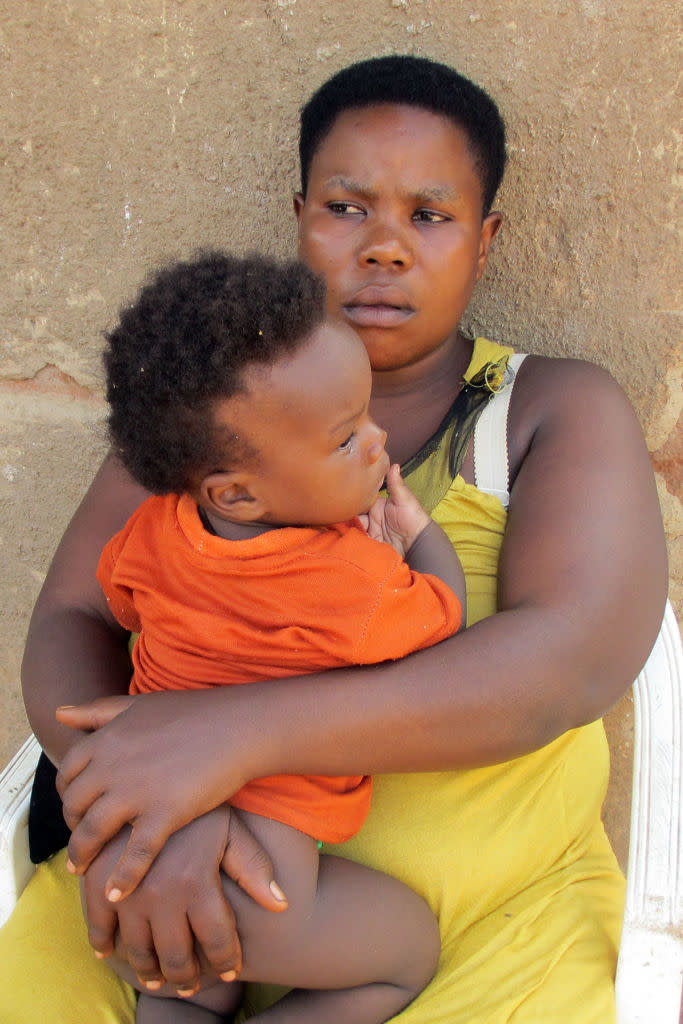Meet the mum who had 44 babies before being forced to stop
A woman has been stopped from having any more kids after she gave birth to 44 children and struggles to care for them.
Mariam Nabatanzi gave birth to a set of twins a year after she was married off at age 12.
Five more sets of twins followed – along with four sets of triplets and five sets of quadruplets.
Three years ago, the 40-year-old Ugandan was abandoned by her husband, leaving her to support their surviving 38 children alone.
"It is true the children are all mine. I don't regret anything and I love them and I am so proud of them because I am the only mother to those children,” she told Reuters.
“I got married when I was a child and God blessed me. I was married off when I was 12-years-old and had my first baby at 13-years-old ... I used to have 44 children but God took away some of them.”

The family live in four cramped and crumbling cement-block houses topped with corrugated iron in a village surrounded by coffee fields 50 kilometres north of the Ugandan capital Kampala.
Ms Nabatanzi has a rare genetic condition – she has unusually large ovaries, releasing multiple eggs in one cycle, and a doctor said contraception could cause health issues.
But the Daily Mirror reports now Ms Nabatanzi has been stopped from birthing any more children after it was revealed her dad had fathered 45 children himself with a number of different women.
According to the publication, the mother confirmed the risk of her falling pregnant again had been removed, with a doctor telling her he “cut my uterus from inside”.
Mother’s desperate acts to support family
Fertility rates across the world are declining, World Bank data shows, with a global average of about 2.4 children per woman.
Family sizes are at their largest in Africa; Uganda's fertility rate is 5.6, one of the continent's highest.
But Ms Nabatanzi's family size makes her an extreme outlier.
After her first sets of twins were born, she went to a doctor who told her she had unusually large ovaries.
He advised her that birth control like pills might cause health problems.
So the children kept coming. Her last pregnancy, two and a half years ago, had complications.
It was her sixth set of twins. One died in childbirth, her sixth child to die.

Then her husband – often absent for long stretches – abandoned her.
His name is now a family curse. Mr Nabatanzi refers to him using an expletive.
Desperate for cash, Ms Nabatanzi turns a hand to everything: hairdressing, event decorating, collecting and selling scrap metal, brewing local gin and selling herbal medicine.
The money is swallowed by food, medical care, clothing and school fees.
On a grimy wall nearby, hang proud portraits of some of her children graduating from school, necks decorated by gold tinsel.
Twelve of the children sleep on metal bunk beds with thin mattresses in one small room with grime-caked walls.
In the other rooms, lucky children pile onto shared mattresses and the rest sleep on the dirt floor.
A single day can require 25 kilograms of maize flour, Nabatanzi says. Fish or meat are rare treats.
"Food is not the only problem, it gets difficult when the children fall sick, paying for their studies, I mean all other basic needs as you know. But I always try to make ends meet," Nabatanzi said.
Struggling mother’s tragic past
Nabatanzi's desire for a large family has its roots in tragedy.
Three days after she was born, Nabatanzi's mother abandoned the family: her father, the newborn girl and her five siblings.
After her father remarried, her stepmother poisoned the five older children with crushed glass mixed in their food. They all died.
Nabatanzi escaped because she was visiting a relative, she says.
"I was seven-years-old then, too young to even understand what death actually meant. I was told by relatives what had happened," she said.
Now Nabatanzi’s large family help her get by, with older children helping to look after the young ones. Everyone pitches in with chores like cooking.
A roster on a small wooden board nailed to a wall spells out washing or cooking duties.

"On Saturday we all work together," it reads.
"We feel good. We do whatever our mother asks us to do even if it means cooking for the younger ones. The older ones usually help with the work when she is not around. She leaves us to take care the young ones and then we put them to sleep. When my mother comes we tell her how the children's day went," said Sunday Timothy Akiki, Nabatanzi's son.
"When I finish my studies I will work hard to help my siblings by paying their school fees because it's not easy for my mother," said Nabatanzi's daughter, Caroline Nandawula.
She grew up wanting to have six children to rebuild her shattered family. Now her greatest wish is for her children to be happy.
"I started taking on adult responsibilities at an early stage," she said.
"I have not had joy, I think, since I was born."
Do you have a story tip? Email: newsroomau@yahoonews.com.
You can also follow us on Facebook and Twitter, download the Yahoo News app from the App Store or Google Play and stay up to date with the latest news with Yahoo’s daily newsletter. Sign up here.


